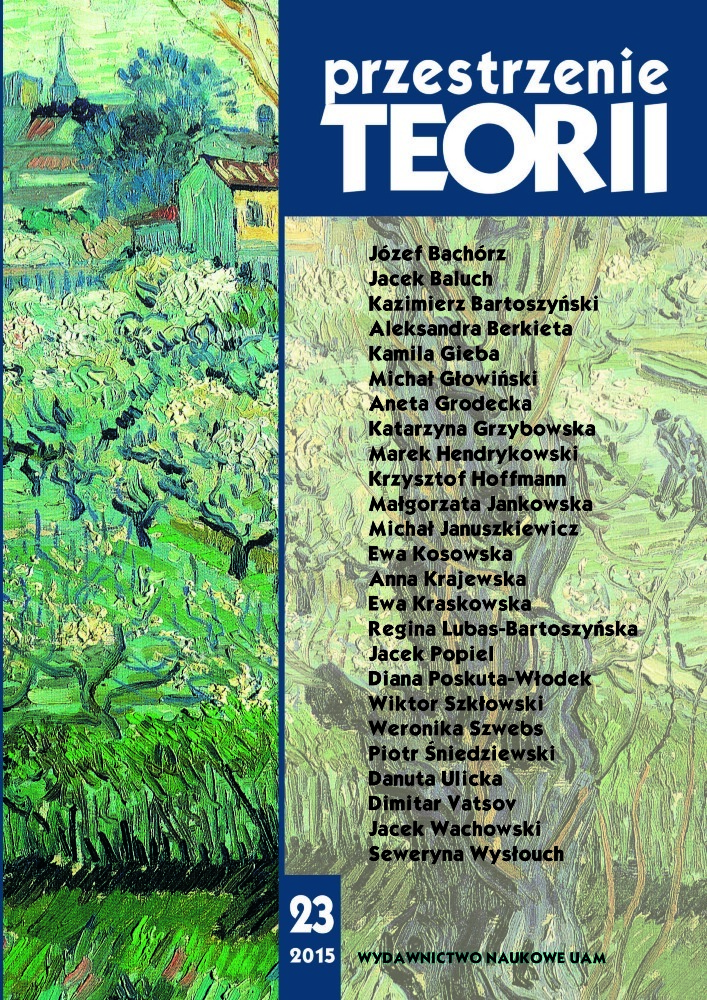Abstrakt
The aim of this paper is to analyze the phenomenon of modern apocrypha from the perspective of cultural studies. The term ‘apocrypha’ is usually associated with early Christian and Gnostic texts, but the tradition of unorthodox writings is also continued in modern Western culture. It is not easy to formulate a comprehensive definition of apocrypha by analyzing this phenomenon only from the perspective of literary, historical and religious studies. The phenomenon of apocrypha is so complex that it should be described based on a kind of methodological bricolage. This method should allow one to understand the role that apocrypha play in modern culture. Many scholars have noticed that it is not possible to point to clear and obvious criteria that would allow us to assign a given text to the category of apocryphal writings. Most typologies of texts which are epistemologically valuable and which help scholars to identify certain features of apocryphal writings do not take into consideration the cultural qualities of non-canonical, unorthodox narratives. From the perspective of cultural studies, modern apocrypha can be seen not only as literary or religious texts but also as an important element of cultural autocommunication. As an element of cultural metacognition, apocrypha can also be regarded as a medium of cultural memory and collective identity.Bibliografia
Apokryfy Nowego Testamentu. Ewangelie apokryficzne, część I Fragment. Narodzenie i dzieciństwo Maryi i Jezusa, red. M. Starowieyski, Kraków 2003.
Assmann J., Pamięć kulturowa. Pismo, zapamiętywanie i polityczna tożsamość w cywilizacjach starożytnych, przeł. A. Kryczyńska-Pham, Warszawa 2008.
Assmann J., Kultura pamięci, przeł. A. Kryczyńska-Pham, [w:] Pamięć zbiorowa i kulturowa. Współczesna perspektywa niemiecka, red. M. Saryusz-Wolska, Kraków 2009.
Balbus S., Między stylami, Kraków 1993.
Beskow P., Osobliwe opowieści o Jezusie. Analiza nowych apokryfów, przeł. J. Wolak, wstęp M. Starowieyski, Kraków 2005.
Draaisma D., Machina metafor. Historia pamięci, przeł. R. Pucek, Warszawa 2009.
Kamieńska A., Twarze księgi, Warszawa 1982.
Łotman J., Uniwersum umysłu. Semiotyczna teoria kultury, przeł. B. Żyłko, Gdańsk 2008.
Nora P., Between Memory and History: Les Lieux de Mémoire, „Representations” nr 26, Special Issue: Memory and Counter-Memory (Spring 1989).
Rahner K., Vorgrimler H., Mały słownik teologiczny, przeł. T. Mieszkowski, P. Pachciarek, Warszawa 1987.
Ricoeur P., LaCocque A., Myśleć biblijnie, przeł. E. Mukoid, M. Tarnowska, Kraków 2003.
Rubinkiewicz R., Wprowadzenie do apokryfów Starego Testamentu, Lublin 1987.
Starowieyski M., Barwny świat apokryfów, Poznań 2006.
Szajnert D., Mutacje apokryfu, [w:] Genologia dzisiaj, red. W. Bolecki, I. Opacki, Warszawa 2000.
Licencja
Autorzy
Autorzy tekstów przyjętych do publikacji w czasopiśmie „Przestrzeniach Teorii” są zobowiązani do wypełnienia, podpisania i odesłania na adres redakcji umowy o udzielenie nieodpłatnej licencji do utworów, z zobowiązaniem do udzielania sublicencji CC.
Zgodnie z umową, autorzy tekstów opublikowanych w czasopiśmie „Przestrzeniach Teorii” udzielają Uniwersytetowi im. Adama Mickiewicza w Poznaniu niewyłącznej i nieodpłatnej licencji oraz zezwalą na użycie sublicencji Creative Commons Attribution-NonCommercial-NoDerivatives 4.0 International (CC BY-NC-ND 4.0).
Autorzy zachowują prawa do dalszego, swobodnego rozporządzania utworem.
Autorzy, którzy wykorzystują w swoim tekście cudze utwory (np. ilustracje, fotografie) proszeni są o dostarczenie do redakcji czasopisma zgodę na publikację od uprawnionych podmiotów.
Użytkownicy
Zainteresowani użytkownicy internetu uprawnieni są do korzystania z utworów opublikowanych po 2015 roku „Przestrzeniach Teorii” tylko w calach niekomercyjnych, pod następującymi warunkami:
- uznanie autorstwa - obowiązek podania wraz z rozpowszechnionym utworem, informacji, o autorstwie, tytule, źródle (odnośniki do oryginalnego utworu, DOI) oraz samej licencji;
- bez tworzenia utworów zależnych - utwór musi być zachowany w oryginalnej postaci, nie można bez zgody twórcy rozpowszechniać np. tłumaczeń, opracowań.
Do wszystkich tekstów opublikowanych przed 2015 r. prawa autorskie są zastrzeżone.
Inne
Uniwersytet im. Adama Mickiewicza w Poznaniu zachowuje prawo do czasopisma jako całości (układ, forma graficzna, tytuł, projekt okładki, logo itp.).
